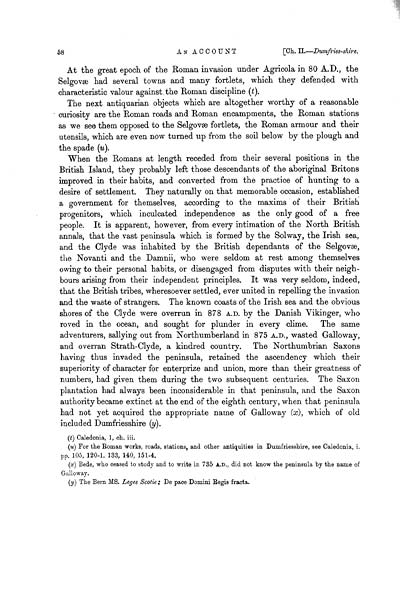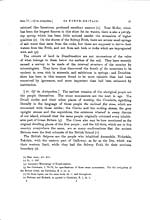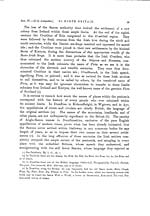Volume 5
(64) Page 58
Download files
Individual page:
Thumbnail gallery: Grid view | List view

58 At the great epoch of the Roman invasion under Agricola in 80 A.D., the Selgovse had several towns and many fortlets, which they defended with characteristic valour against the Roman discipline (t). The next antiquarian objects which are altogether worthy of a reasonable curiosity are the Roman roads and Roman encampments, the Roman stations as we see them opposed to the Selgov� fortlets, the Roman armour and their utensils, which are even now turned up from the soil below by the plough and the spade (u). When the Romans at length receded from their several positions in the British Island, they probably left those descendants of the aboriginal Britons improved in their habits, and converted from the practice of hunting to a desire of settlement. They naturally on that memorable occasion, established a government for themselves, according to the maxims of their British progenitors, which inculcated independence as the only good of a free people. It is apparent, however, from every intimation of the North British annals, that the vast peninsula which is formed by the Solway, the Irish sea, and the Clyde was inhabited by the British dependants of the Selgov�, the Novanti and the Damnii, who were seldom at rest among themselves owing to their personal habits, or disengaged from disputes with their neigh- bours arising from their independent principles. It was very seldom, indeed, that the British tribes, wheresoever settled, ever united in repelling the invasion and the waste of strangers. The known coasts of the Irish sea and the obvious shores of the Clyde were overrun in 878 A.D. by the Danish Vikinger, who roved in the ocean, and sought for plunder in every clime. The same adventurers, sallying out from Northumberland in 875 A.D., wasted Galloway, and overran Strath-Clyde, a kindred country. The Northumbrian Saxons having thus invaded the peninsula, retained the ascendency which their superiority of character for enterprise and union, more than their greatness of numbers, had given them during the two subsequent centuries. The Saxon plantation had always been inconsiderable in that peninsula, and the Saxon authority became extinct at the end of the eighth century, when that peninsula had not yet acquired the appropriate name of Galloway (x), which of old included Dumfriesshire (y). (t) Caledonia, 1, ch. iii. (u) For the Roman works, roads, stations, and other antiquities in Dumfriesshire, see Caledonia, i. pp. 105, 120-1. 133, 140, 151-4. (x) Bede, who ceased to study and to write in 735 A.D., did not know the peninsula by the name of Galloway. (y) The Bern MS. Leges Scotie : De pace Domini Regis fracta.
Set display mode to:
![]() Universal Viewer |
Universal Viewer | ![]() Mirador |
Large image | Transcription
Mirador |
Large image | Transcription
Images and transcriptions on this page, including medium image downloads, may be used under the Creative Commons Attribution 4.0 International Licence unless otherwise stated. ![]()
| Caledonia, or, An account, historical and topographic of North Britain from the most ancient to the present times > Volume 5 > (64) Page 58 |
|---|
| Permanent URL | https://digital.nls.uk/74530252 |
|---|---|
| Description | Vol. V. |
|---|---|
| Attribution and copyright: |
|

